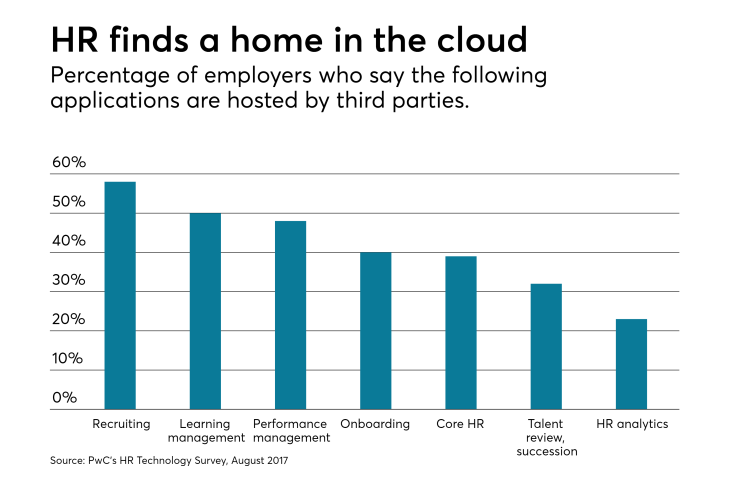When it comes to technology, HR departments may be dropping the ball.
Human resources has fallen behind finance, marketing and technology departments when it comes to integrating digital strategy and new technologies at work, according to a new survey from the Association of Executive Search and Leadership Consultants.
Karen Greenbaum, president and CEO of AESC, says HR departments may have an extra challenge because executives not only have to think about how technology is transforming the function of HR internally, but also how it is changing the organization’s hiring strategy.
“They have almost double duty, in that they’re looking both internally on operational efficiency and then meeting the demands of digital transformation within the organization and the people impact of it,” she says. “In some ways, I think the job is a lot harder because of that.”

The AESC survey of more than 600 consultants found that HR and legal departments were the least digitally advanced. In the U.S. and Canada, respondents gave HR departments an average score of 2.7 out of five for digital transformation, trailed only by legal which received a 2.5. Technology and marketing teams were ranked as the most technologically advanced.
Greenbaum stresses that digital transformation is not simply about implementing a new application or platform in the office. It’s more about looking at how technology, which includes everything from artificial intelligence to analytics and the Internet of Things, is changing how an employer does business, she says.
“It’s not just how you use technology,” she says. “Digital transformation means the business itself is doing things differently.”
There are actionable steps HR departments can take to get better, Greenbaum says. First, employers need to assess if they’ve been able to attract and retain the right employees. A review of the hiring process will help HR better understand if the company is attracting digitally focused candidates, she says. Digital talent is in short supply, she says, because many companies are looking to hire innovative workers.
“These top talents are hot commodities; everyone wants them,” she says.
Leadership also plays a big role, Greenbaum says. If the leadership at a company is not focused on innovation and attracting smart talent, it may be time to consider a change.
“It’s not just, 'Do they understand what artificial intelligence means,’ or what augmented reality means,” she says. “[It’s] ‘Do you really have an organization that can adapt to a new world?’”





